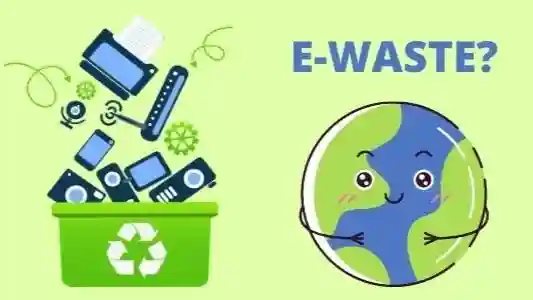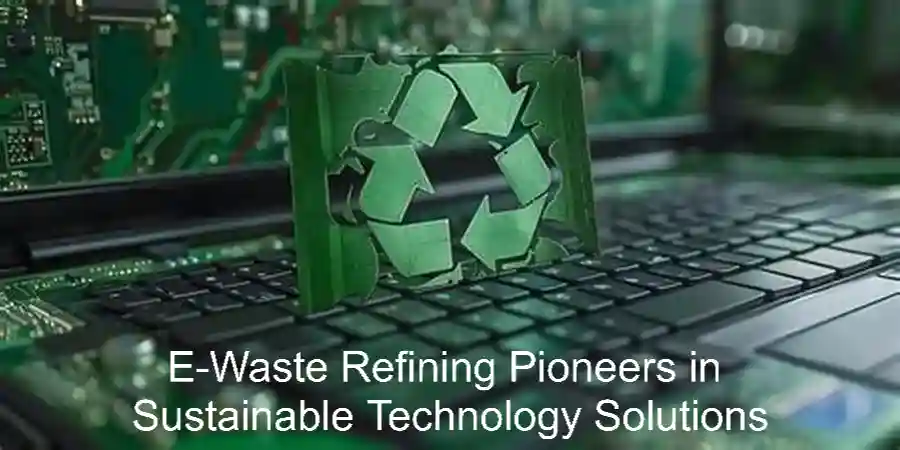Electronic waste is all old electronics we throw away. This includes phones, computers, TVs, and home gadgets. People buy new devices every year. Old ones get tossed out. This creates a big problem.
The world made over 137 billion pounds of e-waste in 2023. That is a lot of waste. Most of it goes to dumps. Only small amounts get recycled properly.
E-Waste Refining Pioneers in Sustainable Technology Solutions work to fix this problem. They turn old electronics into useful materials. These companies save the planet and make money too.

Why E-Waste is a Big Problem
The Numbers Tell a Scary Story
E-waste grows very fast each year. Here are the facts:
- World makes 62 million tons of e-waste yearly
- E-waste grows five times faster than recycling
- Only 22.3 percent gets recycled properly
- Recycling rate will drop to 20% by 2030
- Most e-waste ends up in dumps or bad recycling
What Happens to Bad E-Waste
When e-waste goes to dumps, bad things happen:
- Toxic metals leak into soil
- Water gets dirty and unsafe
- Air becomes polluted
- Animals get sick from poison
- People living nearby get health problems
Money Lost from Bad E-Waste Handling
The world loses $37 billion yearly from bad e-waste handling. This happens because:
- Valuable metals get wasted
- Companies pay more for new materials
- Healthcare costs go up from pollution
- Good recycling jobs get lost
- Raw materials become harder to find

E-Waste Refining Pioneers in Sustainable Technology Solutions: Top Companies
Dell – Making Old Computers New Again
Dell helps customers bring back old computers. They turn these into new parts. Dell does this well:
What Dell Does:
- Takes back any old computer brand
- Breaks down computers safely
- Makes new computers from old parts
- Uses ocean plastic in new products
- Ships products without harm to earth
How Dell Works:
- Robots take computers apart
- Machines separate different materials
- Workers get valuable metals out
- Clean plastic gets used again
- All parts find new homes
Apple – Phone and Computer Recycling Master
Apple made recycling cool and easy. They help people trade old devices. Apple built special robots to help:
Apple Programs:
- Trade old phones for money off new ones
- Daisy robot takes iPhones apart fast
- Recycling centers around the world
- Makes suppliers recycle too
- Wants zero waste to dumps
Apple Tech:
- Robots see and grab phone parts
- Machines sort materials by type
- Special tools get rare metals out
- Quality checks make sure everything works
- Computer systems track all materials
TerraCycle – Hard Stuff Made Easy
TerraCycle takes things others cannot recycle. They make it simple for everyone:
What Makes TerraCycle Special:
- Recycles things no one else will take
- Works with big companies
- Teaches people about recycling
- Has boxes you can buy for hard-to-recycle items
- Makes recycling fun and easy
Recycle Technologies – Complete E-Waste Service
This company helps people recycle responsibly. They focus on doing everything right:
Services They Offer:
- Pick up e-waste from your location
- Destroy data safely
- Take apart electronics properly
- Sell materials to manufacturers
- Give certificates showing proper recycling
Sadoff E-Recycling – Data Protection Experts
Sadoff destroys hard drives so data stays safe. They help businesses recycle without worry:
How They Help:
- Pick up electronics from businesses
- Destroy all data completely
- Use shredders and special magnets
- Give proof data is gone forever
- Recycle materials responsibly
How E-Waste Refining Works
Taking Electronics Apart
Modern recycling uses robots and machines:
Why Robots Help:
- Work faster than people
- See tiny parts people might miss
- Keep workers safe from dangerous materials
- Work all day without getting tired
- Make fewer mistakes
How Robots Work:
- Cameras look at electronics
- Computer brains decide what to do
- Robot arms grab and move parts
- Special tools remove different pieces
- Everything gets sorted by type
Getting Valuable Materials Out
Old electronics have expensive metals inside:
Valuable Stuff in E-Waste:
- Gold in circuit boards
- Silver in switches
- Copper in wires
- Rare earth metals in screens
- Platinum in hard drives
How to Get Metals Out:
- Heat method melts metals out
- Chemical baths dissolve metals
- Electric current pulls metals apart
- Special bacteria eat away other materials
- Magnets separate metal types
Making Sure Materials Stay Pure
Clean materials sell for more money:
Cleaning Steps:
- Sort by material type first
- Remove all plastic and other stuff
- Wash metals with special chemicals
- Test purity levels
- Package for sale to manufacturers
New Technology in E-Waste Recycling
Smart Sorting Systems
Companies use robots with computer brains to sort materials. These systems work better than people:
Smart Features:
- Cameras see what materials look like
- Computer decides what each piece is
- Robot arms move items to right bins
- Systems learn and get better over time
- Work 24 hours every day
Tracking with Digital Records
Some companies use blockchain to track e-waste:
How Tracking Helps:
- Shows where e-waste comes from
- Proves recycling was done right
- Stops fake recycling certificates
- Helps customers trust recyclers
- Makes sure laws get followed
Green Processing Methods
New methods use less energy and chemicals:
Clean Processing:
- Lower heat saves energy
- Less water gets used
- Fewer dangerous chemicals needed
- Solar power runs machines
- Waste heat warms buildings
Companies Around the World
United States Leaders
America has many good e-waste companies:
Top US Companies:
- Urban Mining Company – gets rare metals
- TerraCycle – recycles hard stuff
- CompuCycle – processes everything on-site
- Electronic Recyclers International
- Recycle Technologies
Why US Companies Do Well:
- Strong laws protect environment
- People know recycling is important
- Universities help with research
- Banks lend money for equipment
- Government gives tax breaks
European Success Stories
Europe leads the world in e-waste laws:
European Leaders:
- Stena Metall Group from Sweden
- Umicore from Belgium
- Companies following WEEE rules
- Cross-border recycling networks
- Government-supported programs
What Makes Europe Special:
- Very strict recycling laws
- Companies must take back old products
- Good cooperation between countries
- Strong support for green business
- Lots of research and development
Growing Asian Markets
Asia makes lots of electronics and e-waste:
Asian Companies Growing Fast:
- Chinese mobile phone recyclers
- Japanese metal recovery companies
- Korean technology innovators
- Taiwanese manufacturing partners
- Singapore regional centers
Asian Advantages:
- Lots of e-waste to work with
- Close to electronics factories
- Government support for green business
- Smart technology development
- Good for exporting materials
Problems E-Waste Companies Face
Technical Problems
E-waste gets harder to recycle every year:
Why Recycling Gets Harder:
- Phone parts get smaller and smaller
- New materials are harder to separate
- More types of materials mixed together
- Quality standards get stricter
- Technology changes very fast
How Companies Solve This:
- Invest in better machines
- Train workers on new methods
- Work with universities on research
- Share knowledge with other companies
- Keep updating equipment
Money Problems
Running e-waste business costs a lot:
Financial Challenges:
- Metal prices go up and down
- Expensive machines need repairs
- Illegal recyclers charge less
- Banks want proof business will work
- Markets change without warning
Ways to Make Money:
- Get bigger to reduce costs
- Find more ways to make money
- Use government help programs
- Work together with other companies
- Focus on highest value materials
Following Rules
Different countries have different laws:
Legal Challenges:
- Rules change in different places
- Paperwork takes lots of time
- Shipping across borders is hard
- Liability if something goes wrong
- Keeping up with new laws
How Companies Handle This:
- Hire lawyers who know e-waste law
- Join industry groups for help
- Monitor law changes closely
- Work with government agencies
- Follow best practices always
What Comes Next
Computers Getting Smarter
Computer brains will make recycling better:
How Smart Computers Help:
- Predict when machines need fixing
- Control quality automatically
- Plan work schedules
- Find best prices for materials
- Track everything in real time
Internet Connected Machines
Machines that talk to each other work better:
Connected Benefits:
- Watch machines from anywhere
- Know problems before they happen
- Control processes remotely
- Get data to make better decisions
- Schedule maintenance automatically
New Types of Electronics
Future electronics will need new recycling methods:
New Electronics Types:
- Flexible screens that bend
- Tiny quantum dot displays
- Carbon nanotube components
- Biodegradable circuit boards
- Self-healing electronic materials
Making Recycling Better
Teaching People About E-Waste
People need to know why recycling matters:
Education Programs:
- School visits to teach kids
- Community collection events
- Social media campaigns
- Rewards for recycling
- Easy instructions on proper disposal
Why Education Works:
- More people recycle properly
- Less e-waste goes to dumps
- Recycling companies get more materials
- Communities stay cleaner
- Next generation cares about environment
Government Help
Governments can make recycling easier:
Helpful Laws:
- Companies must take back old products
- Tax breaks for recycling businesses
- Money to help start new companies
- Standards everyone must follow
- Penalties for illegal dumping
Working Together Worldwide
Countries help each other solve e-waste problems:
Global Cooperation:
- Share new recycling technology
- Train workers in developing countries
- Make similar laws across borders
- Fund research projects together
- Stop illegal e-waste shipping
Success Stories
Dell Computer Recycling Program
Dell takes back any brand of computer for free. They turn old computers into new ones. This saves materials and energy. Customers get easy recycling and new computers cost less.
Apple Trade-In Success
Apple makes trading old phones easy. People get money off new phones. Apple gets materials for new products. Old phones do not go to dumps. Everyone wins.
TerraCycle Zero Waste Boxes
TerraCycle sells boxes for hard-to-recycle items. People fill boxes and ship them back. TerraCycle recycles everything inside. This works for items other companies cannot handle.
Why E-Waste Refining Pioneers in Sustainable Technology Solutions Matter
These companies solve big problems:
- Stop toxic waste from harming people
- Save valuable materials from getting lost
- Create jobs in green technology
- Reduce need for mining new materials
- Show other companies how to be responsible
E-Waste Refining Pioneers in Sustainable Technology Solutions prove that business can help the planet. They make money while protecting the environment. Their success encourages other companies to do the same.
Economic Benefits
Good e-waste recycling helps the economy:
- Creates high-paying technical jobs
- Reduces costs for manufacturers
- Keeps valuable materials in use
- Attracts investment in green technology
- Builds new industries
Environmental Benefits
Proper recycling protects nature:
- Keeps toxins out of soil and water
- Reduces greenhouse gas emissions
- Saves energy compared to mining
- Protects wildlife habitats
- Preserves natural resources for future
Social Benefits
E-waste recycling helps communities:
- Provides safe jobs for workers
- Improves public health
- Teaches environmental responsibility
- Brings communities together
- Creates pride in doing right thing
The Future of E-Waste
More Electronics Coming
People will buy even more electronics:
- Internet of Things devices everywhere
- Electric cars need batteries
- Smart home gadgets in every room
- Wearable technology gets popular
- Virtual reality becomes common
Better Recycling Technology
New technology will handle more e-waste:
- Robots get smarter and faster
- New chemicals work better and safer
- Sorting becomes more accurate
- Processing uses less energy
- Recovery rates improve
Circular Economy Growth
More companies will design for recycling:
- Products made to come apart easily
- Use recycled materials from start
- Repair instead of replace
- Share and rent instead of buy
- Design for multiple life cycles
Taking Action Now
What People Can Do
Everyone can help with e-waste:
- Find certified recyclers in your area
- Never throw electronics in regular trash
- Use trade-in programs when buying new
- Donate working electronics to others
- Learn about proper e-waste disposal
What Businesses Can Do
Companies can be part of the solution:
- Partner with certified e-waste recyclers
- Design products for easy recycling
- Take responsibility for product lifecycle
- Educate customers about recycling
- Invest in sustainable technology
What Governments Can Do
Laws and policies make big differences:
- Require extended producer responsibility
- Fund e-waste collection programs
- Set strict recycling standards
- Support research and development
- Educate citizens about proper disposal
Conclusion
E-Waste Refining Pioneers in Sustainable Technology Solutions are revolutionizing electronic waste management by converting discarded devices into valuable materials. Companies like Dell, Apple, and TerraCycle demonstrate that environmental protection and profitability can coexist. With global e-waste reaching 62 million tons annually and only 22.3% properly recycled, these pioneers use advanced robotics and smart sorting systems to recover precious metals, create jobs, and protect public health while building a sustainable circular economy.






